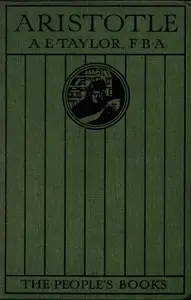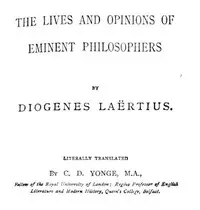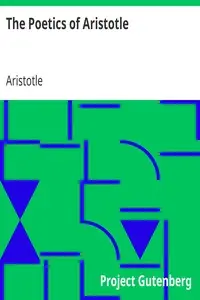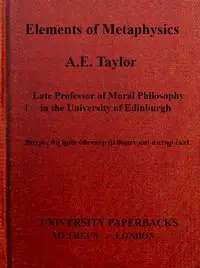"Aristotle" by A. E. Taylor is a deep investigation into the life, theories, and impact of a well-known philosopher written in the 20th century. It highlights Aristotle's important marks on fields, such as philosophy and science, and it makes clear how he shaped future ways of thinking. It stresses how Aristotle’s ideas not only molded philosophical talks but also modern literature and science. The book starts by speaking of Aristotle’s importance, as his name and thoughts are recognizable similar to poets and historical figures. It goes over his birth in Stagirus and early times at Plato’s Academy in Athens, providing insight on his development. It also briefly goes over his roles, such as tutoring Alexander the Great and starting the Lyceum, setting up the start of his thinking. Furthermore, it refers to his philosophical techniques and putting scientific knowledge into categories, preparing for a discussion on his ideas in later parts.

Aristotle
By A. E. (Alfred Edward) Taylor
Explore the life and impact of a man whose ideas shaped philosophy, science, and even the way we think today.
Genres
Released
2015-01-16
Formats
mobi
epub
mobi (images)
epub3 (images)
epub (images)
txt
Free Download
Summary
About the AuthorAlfred Edward Taylor, usually cited as A. E. Taylor, was a British idealist philosopher most famous for his contributions to the philosophy of idealism in his writings on metaphysics, the philosophy of religion, moral philosophy, and the scholarship of Plato. He was a fellow of the British Academy (1911) and president of the Aristotelian Society from 1928 to 1929. At Oxford he was made an honorary fellow of New College in 1931. In an age of universal upheaval and strife, he was a notable defender of Idealism in the Anglophone world.
Alfred Edward Taylor, usually cited as A. E. Taylor, was a British idealist philosopher most famous for his contributions to the philosophy of idealism in his writings on metaphysics, the philosophy of religion, moral philosophy, and the scholarship of Plato. He was a fellow of the British Academy (1911) and president of the Aristotelian Society from 1928 to 1929. At Oxford he was made an honorary fellow of New College in 1931. In an age of universal upheaval and strife, he was a notable defender of Idealism in the Anglophone world.
Total Reviews
10.0k
Total reviews from Goodreads may change















